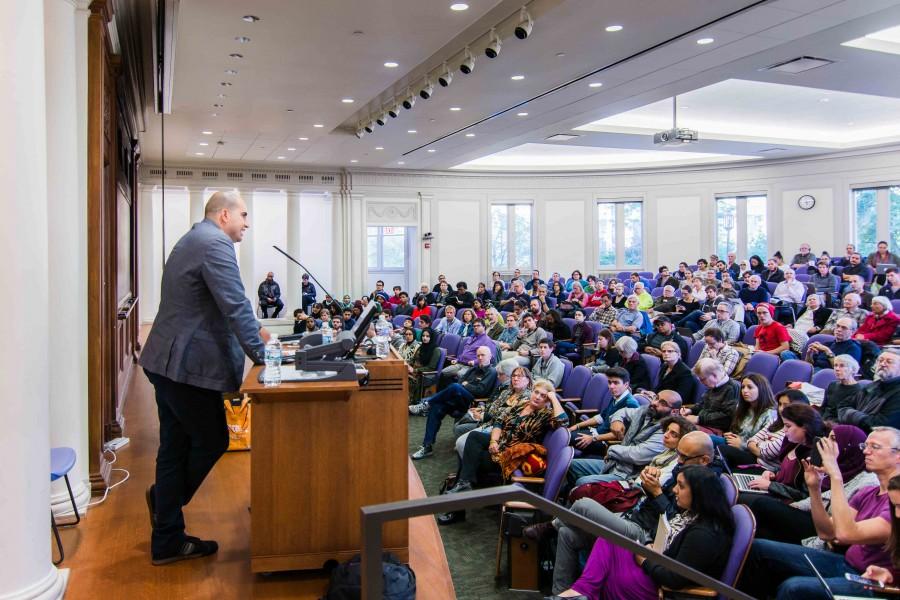Steven Salaita talks academic freedom after U. of I. controversy
Steven Salaita addresses a crowd of about 200 in Harris Hall. Salaita, a professor who was fired from the University of Illinois over controversial tweets regarding the conflict in the Gaza Strip, delivered a speech about academic freedom and his views on the events of the summer.
October 7, 2014
Academic Steven Salaita, who lost a job offer from the University of Illinois in August after posting controversial tweets, spoke in defense of academic freedom Monday night in front of a packed auditorium in Harris Hall.
Salaita, a scholar of Palestinian descent who focuses on American Indian and indigenous studies, wrote a series of politically charged tweets about the conflict in the Gaza Strip. Illinois’ Board of Trustees rescinded the tenured professorship it offered to Salaita, sparking widespread debate on free speech in academia.
In an event hosted by Northwestern’s branch of Students for Justice in Palestine, Salaita defended his posts on social media this summer, criticizing the “corporatization of academia.” The event drew about 200 people from the NU community and the Midwest.
Salaita’s visit to NU marks the first day of a weeklong Chicago-area speaking tour. In his prepared remarks, Salaita attributed the withdrawal of his job offer partially to the influence of Zionist donors and rushed decision-making on the part of the trustees. Salaita continued by sketching out what he called the “eroding of academic freedom.”
He pointed to the influence of business interests in university policies and accused higher education officials of adhering to a political status quo. He cited universities’ increased reliance on easily fired non-tenured faculty, rising administrative salaries and the growth of collegiate sports, which he said emphasize branding over education.
Salaita also spoke about Palestinians, who he called the latest in a long line of suppressed cultural and ethnic groups, comparing them and their advocates to African Americans, Native Americans and Jews.
“A shameful irony is that Jews were long marginalized in the academy because of their supposed dangers to Anglo-civility,” Salaita said. “(They were) victim to rationalizations for their exclusions that sadly don’t look terribly different than the ones now being used against supporters of Palestinian civil rights.”
After Salaita’s speech, Noor Hasan (Weinberg ’14) moderated a question-and-answer discussion. The conversation ranged from support for Salaita to discussions of academia’s role in regulating social media and comments on the larger context of Zionist roots.
Serene Darwish, a Weinberg senior and member of SJP, said after the event the group brought Salaita to campus because of his views on academic freedom.
“This event was supposed to be both … in solidarity with Palestinians and also in solidarity with Salaita and other victims of these attacks on free speech across the country,” Darwish said.
Not everyone was convinced by Salaita’s arguments.
“It’s not really about academic freedom,” said Weinberg junior Jonathan Kamel, president of Wildcats for Israel. “It’s about the tolerance of hate speech on college campuses, and in my opinion, hate speech, no matter what form, is not acceptable.”
Burgwell Howard, assistant vice president of student engagement, attended the talk and said he thinks NU was a place for ideas to be shared.
“Sometimes we have to defend the things that we don’t agree with,” Howard said. “No one says you’re supposed to agree with anything in a university.”
Lydia Ramsey contributed reporting.
Email: [email protected]
Twitter: @JasonMast5


